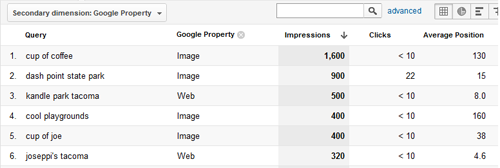In October of 2011, Google stopped passing along keyword search terms for users logged in to its products, including Gmail and the popular Google Chrome browser. Users are now redirected to a secure search form, leaving webmasters and SEO specialists to scratch their heads at suddenly much less useful Google Analytics data. “Not provided” has quickly become the most popular search term in the world. Fortunately, there are still methods to extract at least some of this missing data.
Google’s Webmaster Tools (you are using Webmaster Tools, right?) can be integrated with your Google Analytics account to provide some of the missing data, through a few simple steps. When logged in to Analytics and viewing site data, click on “traffic sources” in the left-hand column, and select “search engine optimization.”
You should see a prompt to connect your analytics account with the Google Webmaster Tools information for your website. (If you don’t already have a Webmaster Tools account, set that up first.) Once you have properly linked your account, you can access keyword data under “queries.”
Google Webmaster Tools provides a somewhat different keywords view than what we have become accustomed to. Numbers of clicks and impressions are aggressively rounded and inexact. Some of the results seem nonsensical at first glance, until filtered by Google Property at the “secondary dimension” tab. For example, a site having little to do with coffee might receive a great many impressions for the keywords “cup of coffee,” because of a particularly good coffee photo.
When narrowed by Google property, we can see that these initially mystifying impressions come from Google image search. In this example, we would discount the impressions for “Cup of Coffee” (with a 0% click through rate) and consider the impressions for the next search term, which is relevant to the site. For more meaningful results, click on the “clicks” column header to show queries with the greatest number of actual clicks through to your site.

Some in the SEO community fear that Google’s recent actions signal a general movement away from sharing keyword data. SEO practice is an ever-evolving discipline. Whatever the future of keyword search information, good search engine optimization practice will always include an understanding of what site content is accessed most frequently, and what terms users must be looking for in order to arrive at that content. While one popular tool for ascertaining this information has become more difficult to use, webmasters and SEO specialists will continue to ferret it out.

Comments